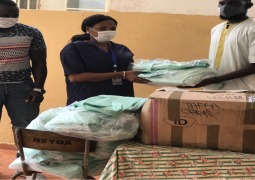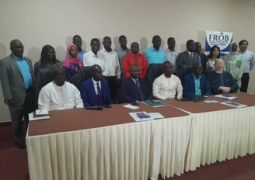The struggle to comprehend or understand what fibroids is all about, is cross cutting in The Gambia with several affected women facing serious challenges and finding it difficult to detect fibroids early.
Isatou Camara, a survivor, who has been battling with fibroid for the past three years, explains her difficulty to conceive after losing her first child and the numerous pains in her abdomen and anus each time she uses the toilet.
Camara, who also confirms marrying late, also suspects that could be part of the reasons she had fibroids.
"I didn't get married early and I believe it is because of that I am suffering from fibroids and this is really affecting my health condition. So, I don’t have any choice but to remove it through surgery." she said.
Another survivor, Fatima Faye, confirmed experiencing the ailment in 2015 and this was after it was confirmed by medial expert.
She however, revealed that after her last delivery in 2010, she used to have severe pain but thought it was normal at a time.
"I used to have severe pain during my menstruation and is usually prolonged. So, it was after seeking medical attention that they advised for it to be removed’’.
Faye pointed out that this [period] was a difficult and depressing moment for her because each time, she got cramps as the pain is always severe.
"I was not able to conceive, my last born is now 16 years old after that I cannot give birth.’’
Limited Resources, Growing Needs
Despite its growing awareness, The Gambia’s health care system faces critical challenges in addressing fibroids. Diagnostic tools such as ultrasounds are not widely accessible, especially in rural areas.
Surgical treatment such as myomectomy or hysterectomy is available in urban hospitals like the country’s main referral hospital - Edward Francis Small Teaching Hospital and other major hospitals in the country, but waiting time and costs can be prohibitive.
Dr. Momodou Lamin Waggeh, the Chief Executive Officer (CEO) at the Brikama District Hospital said with the district hospital being the biggest with a high delivery rate, fibroid is also becoming another thing that women face which warrants the administration to seek more experts specialised in that area.
"Basically, we have patients that will undergo surgery and what we do is to conduct surgical for women"
Dr. Waggeh appealed to the Ministry of Health to replace surgical equipment at the Brikama District Hospital at least every six (6) months in a bid to ease the problem, particularly for women with fibroid.
"Sometimes when fibroid cases are registered in EFSTH in Banjul and Kanifing, it becomes a big challenge for us as we stand in the line for long before surgery will be done on them." he added
Advocating for Women’s Health
In recent years, grassroots organisations and advocates have started breaking the silence. Groups like Girls’ Pride Gambia uses social media to share key information and personal stories, educating women on symptoms, treatment options, and the importance of early medical attention.
Health professionals are also calling for a national strategy on fibroids and other reproductive health issues.
Cultural Silence and Delayed Care
In many Gambian communities, women’s reproductive health remains a taboo. The shame associated with discussing menstruation and fertility can lead to delayed diagnoses and untreated symptoms.
Many women, particularly in some cultures, believe that fibroids are caused by spiritual imbalances, curses or divine punishment; thereby viewing fibroid as a spiritual problem, a sign of infertility, or a curse. This can lead them to seek spiritual healing or prayer instead of medical intervention.
Fibroids are often associated with stigma and discrimination, especially in cultures where childbearing is highly valued. Women may delay seeking treatment or feel pressured to hide their condition to avoid social repercussions.
This silence is costly. Women with fibroids often experience anemia from blood loss, reduced productivity, and strained personal relationships. Infertility, is a common concern with advanced fibroid cases.
Understanding Fibroids
Uterine fibroids are benign tumors that grow in or around the uterus. It is also an outgrowth on the uterus which can also be inside of the uterus and also within the wall of the uterus.
The cause of the fibroids is yet to be established but there are some risk factors which increases one’s chance of having the fibroid. Some experts believe it is inherited through Genetic transfer and also marrying late and the estrogen hormone, also increases one’s risk of having fibroids.
Read Other Articles In National News





